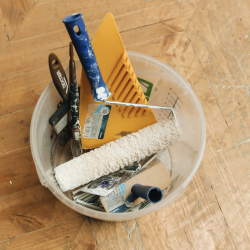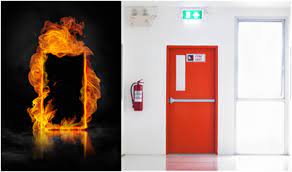Home improvement contractors play a pivotal role in enhancing the functionality and aesthetics of residential properties. From remodeling kitchens to installing new flooring, their expertise is sought after to transform houses into dream homes. However, amidst the flurry of design choices and construction tasks, there’s one crucial aspect that often gets overlooked – fire door safety.
In the event of a fire, properly installed and maintained fire doors can save lives by preventing the spread of flames and smoke, providing occupants with crucial time to escape safely. As such, home improvement contractors must prioritize fire door safety to ensure the well-being of their clients and adhere to regulatory requirements. In this article, we’ll delve into why fire door safety is paramount for contractors and explore essential considerations in ensuring compliance and effectiveness.
Understanding Fire Door Functionality
Fire doors are specially designed to withstand fire for a specified period, typically ranging from 20 minutes to several hours, depending on the building code and intended use. These doors serve as barriers, compartmentalizing fire-prone areas and impeding the rapid spread of flames and smoke throughout a structure. They are equipped with fire-resistant materials, seals, and hardware to maintain their integrity under intense heat.
Legal and Regulatory Compliance
Compliance with fire safety regulations is not optional – it’s a legal obligation for contractors. Building codes mandate the installation of fire doors in specific locations, such as stairwells, corridors, and rooms containing hazardous materials. Failure to adhere to these regulations can result in hefty fines, legal liabilities, and even the suspension of construction permits.
Moreover, liability concerns loom large for contractors. In the unfortunate event of a fire-related injury or fatality, negligence in installing or maintaining fire doors can lead to costly lawsuits and irreparable damage to a contractor’s reputation. Thus, ensuring compliance with fire door safety standards is not just about meeting legal requirements but also about mitigating risks and upholding professional integrity.
Protecting Occupants and Property
Beyond regulatory obligations, the primary purpose of fire door installation is to safeguard lives and property. In residential settings, where occupants may include families with children or elderly individuals, the importance of fire safety cannot be overstated. Fire doors act as a vital line of defense, giving occupants precious time to evacuate safely and minimizing the spread of fire damage within the home.
Furthermore, property owners invest significant resources in their homes, making it imperative for contractors to prioritize measures that protect these investments. In the event of a fire, the containment provided by properly installed fire doors can mitigate property damage, potentially saving homeowners from substantial financial losses.
Ensuring Proper Installation and Maintenance
Proper installation and regular maintenance are critical to the effectiveness of fire doors. Home improvement contractors must ensure that fire doors are installed correctly according to manufacturer specifications and relevant building codes. This includes proper placement, anchoring, and sealing to maintain the integrity of fire-rated barriers.
Additionally, routine inspection and maintenance are essential to identify any signs of wear, damage, or malfunction that may compromise the functionality of fire doors. Contractors should educate clients about the importance of periodic inspections and recommend partnering with qualified professionals for maintenance and repairs.
Educating Clients and Stakeholders
Effective communication is key in promoting fire door safety awareness among clients and stakeholders. Home improvement contractors should take proactive measures to educate clients about the significance of fire doors and their role in overall fire safety preparedness. This may involve providing informational materials, conducting seminars, or offering personalized consultations to address specific concerns.
By empowering clients with knowledge about fire door safety, contractors not only fulfill their ethical responsibility but also foster trust and confidence in their services. Clients who are well-informed about fire safety measures are more likely to prioritize investments in quality fire-rated doors and related components, thereby enhancing the overall safety and resilience of their homes.
Conclusion
In the realm of home improvement, fire door safety is a non-negotiable aspect that contractors cannot afford to overlook. Beyond regulatory compliance, it is a moral imperative and a fundamental obligation to prioritize the safety and well-being of clients and occupants. By understanding the critical role of fire doors, ensuring compliance with regulations, and advocating for proactive maintenance, contractors can contribute to creating safer residential environments and protecting valuable assets.
As guardians of fire safety, home improvement contractors wield the power to make a tangible difference in reducing fire-related risks and enhancing the resilience of homes against potential disasters. Let us embrace this responsibility with diligence and dedication, knowing that our efforts today can save lives and preserve the sanctity of homes for generations to come.


